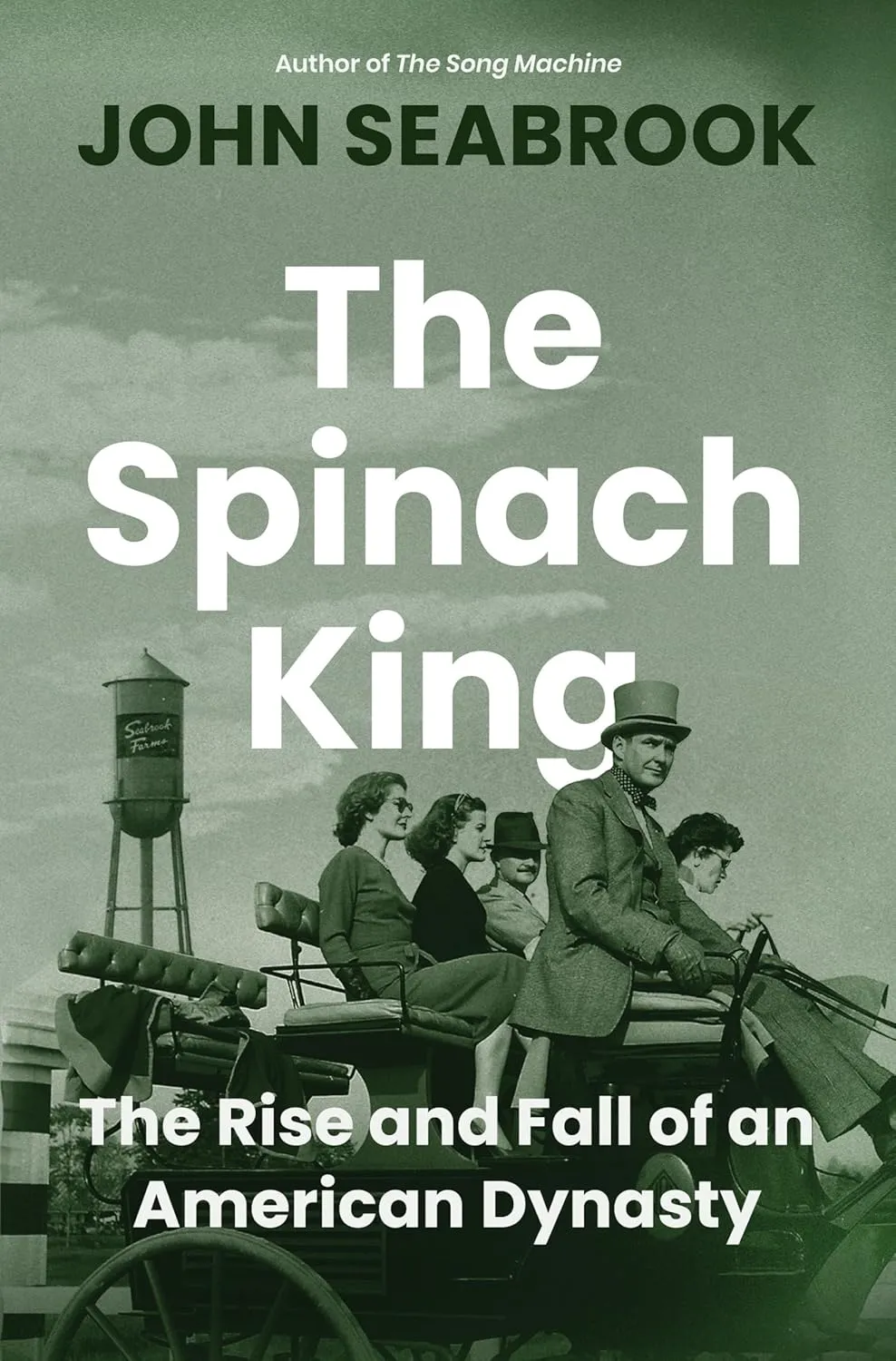When you think of South Jersey, you might picture quiet farmland, charming roadside markets, and the freshest produce money can buy. But in The Spinach King, author John Seabrook pulls back the curtain on a surprising family history that’s anything but wholesome.
Seabrook’s new book isn’t just a memoir—it’s an excavation. It unearths the tangled, powerful, and at times explosive legacy of Seabrook Farms, a once-massive agricultural empire that turned frozen vegetables into an industrial goldmine. At its peak, the Cumberland County operation churned out one-third of the nation’s frozen vegetables and employed thousands of workers, many of whom were immigrants, war survivors, and Black laborers who saw South Jersey as a land of opportunity.
But as Seabrook reveals, the shiny packaging on that iconic creamed spinach masked a history of racism, family betrayal, mob ties, and corporate abuse—and the writer’s journey into that history is as personal as it gets.
For more stories that celebrate and examine New Jersey’s rich past and present, visit Explore New Jersey.
🌱 From Humble Soil to a Farming Empire
Seabrook Farms was born before New Jersey was even nicknamed the “Garden State.” It began in the late 1800s, when the Seabrook family purchased 13 acres of farmland in South Jersey. The early years were modest, even unremarkable. The founder struggled, and his grave was never marked. But in the hands of the next generations, especially the fiercely ambitious C.F. Seabrook, the business exploded.
C.F. turned the farm into a “vegetable factory” by investing in cutting-edge processing technology, studying industrial titans like Henry Ford, and applying ruthless efficiency to both the crops and the people working the fields. The business ballooned to over 50,000 acres and helped shape mid-century America’s frozen food obsession. By the 1950s, Life magazine dubbed Seabrook Farms the largest vegetable processor on the planet.
👨👩👦 A Family Business Built on Tension
Seabrook’s memoir traces not just the corporate rise, but also the family dysfunction that came with it. Fathers and sons locked horns over business decisions, inheritance, and control. Seabrook’s own father, Jack, described his father—C.F.—as “an addict, a predator, and a tyrant.”
Despite the luxury and social prestige the Seabrook name afforded (including parties with Hollywood royalty like Eva Gabor, who famously skinny-dipped in the family pool), the emotional cost of living in that world was steep.
The family’s women—rarely involved in the business—served as emotional anchors, holding together what Seabrook calls a “fractured empire” of ambition, resentment, and silence.
🧨 When Spinach Meets Scandal
Seabrook doesn’t hold back in detailing the darker corners of his family’s legacy.
The farm’s workforce included Black Southerners escaping Jim Crow, European refugees, and Japanese Americans released from WWII internment camps, many of whom were housed in segregated villages on the property.
In 1934, a strike by Black workers over unfair treatment and low wages led to a violent showdown. Seabrook’s grandfather responded by hiring gangsters and turning to local Ku Klux Klan chapters to intimidate workers. A Seabrook uncle was even caught on microfilm as the driver of a truck that rammed into a crowd of protesters, injuring several.
“I was supposed to be doing public relations for the family,” Seabrook writes. “Not investigating it.”
But investigate he did—and the stories he unearthed rewrote not only the narrative of Seabrook Farms but his own identity as a writer, son, and heir to a complicated empire.
📚 A Personal Reckoning Decades in the Making
Although Seabrook first tackled the story in a 1995 New Yorker piece, he didn’t fully dive into the material until decades later, after the passing of both his parents. The result is The Spinach King—his fifth book, and by far his most vulnerable.
“It’s not like handing people just a book,” he says. “It’s handing them my life.”
With brutal honesty, he reflects on what it meant to grow up in the shadow of a name that inspired both admiration and fear across South Jersey. And while the Seabrook empire crumbled years before he ever entered the boardroom, its ghost still lingered in every family dinner, every local conversation, every unspoken memory.
🥬 From Empire to Evolution
Today, remnants of the Seabrook business still exist under the name Seabrook Brothers & Sons, now run by some of John’s cousins. They still sell over 100 vegetable products—including, yes, the iconic frozen creamed spinach—and are a part of the state’s broader agricultural revival.
But The Spinach King doesn’t end with a return to business-as-usual. It’s a story of personal growth, cultural accountability, and what it means to face history head-on, especially when that history is your own.
And for John Seabrook, who never inherited the family business acumen but loves to garden, that might just be the most fertile ground of all.
For more in-depth features, personal stories, and slices of life from around the Garden State, keep exploring Explore New Jersey.
John Seabrook Brings The Spinach King Home to Princeton

📚 Scandal, power, and a family empire that crumbled from the inside—this is New Jersey history like you’ve never heard it.
On Monday, June 16, 2025, the Princeton Public Library opens its doors to something more than a book talk—it hosts the unraveling of a forgotten dynasty. John Seabrook, a staff writer at The New Yorker for more than 30 years, will discuss his new memoir, The Spinach King: The Rise and Fall of an American Dynasty, in partnership with Library and Labyrinth.
Part history, part investigative memoir, and all heart, The Spinach King is a gripping account of one of South Jersey’s most powerful and dysfunctional families. It’s a deeply personal excavation of the Seabrook Farms empire—once dubbed by Life magazine as “the biggest vegetable factory on earth”—and the secrets, scandals, and shadows that haunted its legacy. This isn’t just a New Jersey story; it’s the New Jersey story.
🎟️ Event Details:
📍 Princeton Public Library
📅 Monday, June 16, 2025
🕖 7:00 PM
Explore more events in New Jersey
🌿 From Garden State to Gilded Gates
At the height of its power, Seabrook Farms covered more than 50,000 acres in Cumberland County, employing thousands and feeding millions. Its frozen vegetables—especially the famous creamed spinach—defined mid-century American dining. But behind the brand’s sunny marketing image was a much darker reality.
In The Spinach King, Seabrook peels back generations of secrecy, exposing everything from mob entanglements and Ku Klux Klan violence to family betrayals, Swiss bank accounts, and a strikebreaking scandal that involved gangsters and bombs. And it all happened right here, in New Jersey soil.
🥬 Meet the Players in This True-Life Drama
At the helm of the empire was C.F. Seabrook, a man who styled himself after Henry Ford and ruled his farmland like a corporate kingdom. His son Jack Seabrook—dashing, well-dressed, and always accompanied by fine wine and famous women—was primed to inherit the throne. But as the book reveals, their relationship was far from idyllic.
This was a family where sons sued fathers, brothers undercut each other, and anyone who told the truth risked being disowned—or worse. There were stories of Eva Gabor skinny-dipping in the family pool, boozy nights in secret cellars, and a farm worker strike in 1934 that nearly burned the entire empire to the ground.
“Having left this material for his writer son, my father must have wanted the story told, even if he couldn’t bear to tell it himself,” Seabrook writes. And tell it, he does—with honesty, grace, and a journalist’s unflinching eye.
📖 A Story Decades in the Making
Seabrook, now a seasoned writer for The New Yorker, first scratched the surface of this story in the mid-1990s, publishing a controversial essay that caused significant tension within his family. But it wasn’t until after his parents passed that he decided to truly dig in—and write the book that was always waiting inside him.
What he found in the family archives, public records, and long-buried memories reshaped everything he thought he knew.
“The Spinach King is more than a memoir—it’s a forensic autopsy of the American Dream,” one early reader wrote. “Succession, but make it spinach.”
📚 Why This Matters for New Jersey
Beyond its juicy plot and scandalous characters, The Spinach King offers a raw, reflective look at some of the most pressing themes in New Jersey history: immigration, labor, race, capitalism, and power. It chronicles how the Seabrook family profited from displacement, exploited cheap labor, and built an empire on the backs of vulnerable communities—many of whom still live in the area today.
It’s a reminder that the Garden State’s soil is rich, not just with crops, but with complex stories that deserve to be unearthed.
🎤 Don’t Miss This One-Night-Only Event
John Seabrook’s appearance at Princeton Public Library promises to be more than a reading—it’s a homecoming, a reckoning, and a night that blends literature, legacy, and local history. Expect readings from the book, a candid conversation about the writing process, and a powerful Q&A about what it means to finally tell the truth.
Whether you’re a fan of investigative journalism, memoir, family drama, or New Jersey history, this is the can’t-miss literary event of the summer.
📍 Explore more upcoming New Jersey events and keep discovering the stories that shaped the state we call home.
Explore New Jersey—because the real stories grow deeper than you think. The past grows here too.












